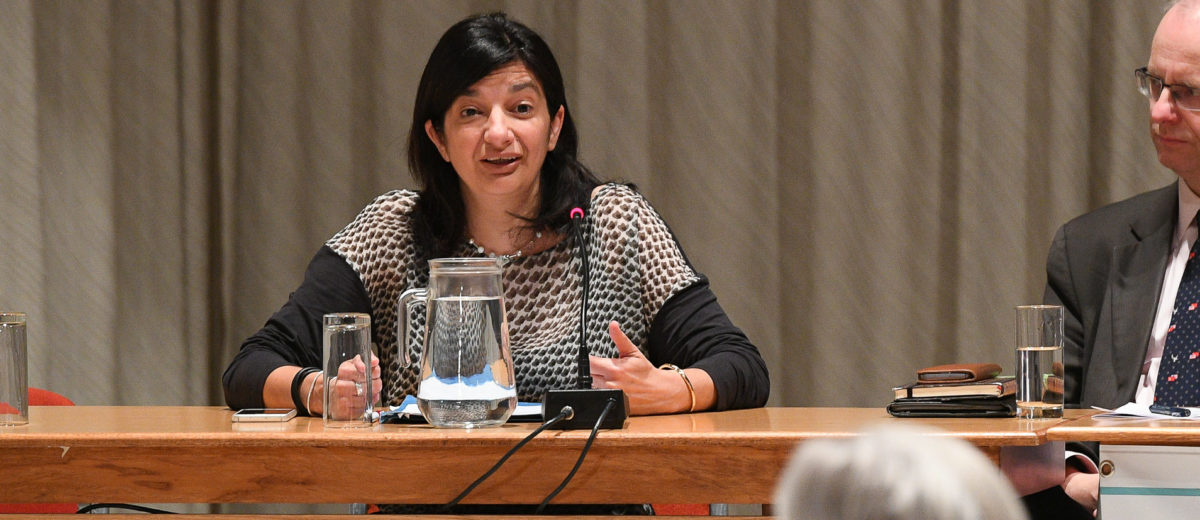Europeans like you and me are the core problem of the current migration issue. The root cause of Europe’s response is fear. Our fears make it possible for populist parties to influence centrist parties move to the right.
And fear is False Expectation Appearing Real. I learnt that from Dr Katrine Camilleri, head of Jesuit Refugee Services in Malta. She has been helping refugees and forcably displaced persons for two decades. She gave a blistering talk on Europe’s response to the refugee situation at the State of Europe Forum in Valletta last year. Malta lies right on the Central Mediterranean migration route from Libya to Europe, and is thus on the front line of refugee reception, along with Greece, Italy and Spain.
‘For a country the size of a rock’, she told us, ‘these arrivals strain not only our logistical capacities but also our longstanding tradition of hospitality. It is a little ironic that the country that prides itself on having welcomed St. Paul with unusual kindness, as the Acts of the Apostles tells us, welcomes these arrivals by locking them up in detention centres.’
‘Migrants were held in detention in some cases up to 18 months. The conditions were completely substandard. The centres were overcrowded. People didn’t have access to basic services, which we knew were desperately needed.’
Walls
Many, she said, were fleeing war and massive violation of human rights. The journey itself made many of them pass through hardships difficult to imagine. Many were legally entitled to international protection. Katrine couldn’t but ask if receiving these people who turned up at our doors asking for help was not completely out of sync, completely incongruent with our self-perception and with our European values?
The response of the EU to the asylum seekers who came through Greece in 2015 was much the same, she continued. Although we are part of a Union founded on the core values of solidarity and respect of human rights and human dignity, we saw states acting alone, refusing to see this as a European challenge and refusing to develop a common and effective response.
‘European states are still responding by putting up walls,’ Katrine said. ‘We put up these walls to protect ourselves from real or perceived threats to our culture, to our Christian values and heritage, to our stability, to our comfort and possibly to our security. Walls in many shapes and forms: border walls, ever more sophisticated and militarized border control measures, agreements with third countries such as Turkey, and Libya, countries where asylum seekers can’t find effective protection. The list is endless.
‘These walls are, in part, the result of indifference. Pope Francis talks repeatedly about the culture of indifference, which doesn’t allow us to see the needs of the other, much less to empathize with them. Fear makes you completely unable to think of anything else except your own protection. Everything looks like a threat and you respond accordingly. You put up walls to protect yourself.
Less human
‘On the individual as well as on the national level, fear leads us to build walls and makes us incapable of looking beyond our own self-preservation, to the needs of the people who are going to be affected by those walls.
‘I don’t want to minimise the challenges posed by large numbers of arrivals. The challenges are real. People worry that it will change Europe, and I say they are probably right. But I believe that what will change us is how we choose to react to this challenge. We can choose to put up walls, to react out of fear, out of an instinct for self-preservation or we can choose to welcome, to receive the people who are arriving at our shores, who are fleeing as we ourselves would want to be treated.
‘Reacting out of fear is also very problematic for what it does to us. Fear prevents us from seeing refugees arriving at our borders as people, as individuals with needs and with rights. Dead people at the border, arbitrary detention and miserable conditions, ill-treatment, abuse: what to do? Fear allows us to assume that the violation of human rights is in certain circumstances necessary and justified. Fear allows us to dehumanize the refugees and close our eyes to their needs and suffering, which we are obliged by law to respond to. We are obliged by law to protect and assist refugees.
‘Not only the face of Europe is changed but our soul. We become less human. We turn to the opposite of what we profess as individuals and as a Union, which is supposedly founded on solidarity and respect for human rights. We respond in a way that is anything but Christian even if we do it ironically to protect our Christian heritage.’
Till next week,



